British Telecom's Strategic Analysis: PESTEL, SWOT, and Five Forces
VerifiedAdded on 2020/12/29
|18
|6172
|307
Report
AI Summary
This report provides a comprehensive analysis of British Telecom (BT), a multinational telecommunications company. It begins with an executive summary outlining the report's key findings, followed by an in-depth examination of BT's macro and micro environments. The main body includes a PESTEL analysis, evaluating the political, economic, social, technological, environmental, and legal factors impacting BT's operations. The report then applies Porter's Five Forces framework to assess the competitive landscape and identifies BT's resources, skills, capabilities, and core competencies. A SWOT analysis is employed to evaluate BT's strengths, weaknesses, opportunities, and threats, leading to strategic decision-making recommendations. The analysis considers challenges such as Brexit, customer service issues, and global competition, while also highlighting opportunities in developing markets and technological advancements. The report concludes by summarizing the key insights and providing references for further research.

British telecom
analysis
analysis
Paraphrase This Document
Need a fresh take? Get an instant paraphrase of this document with our AI Paraphraser
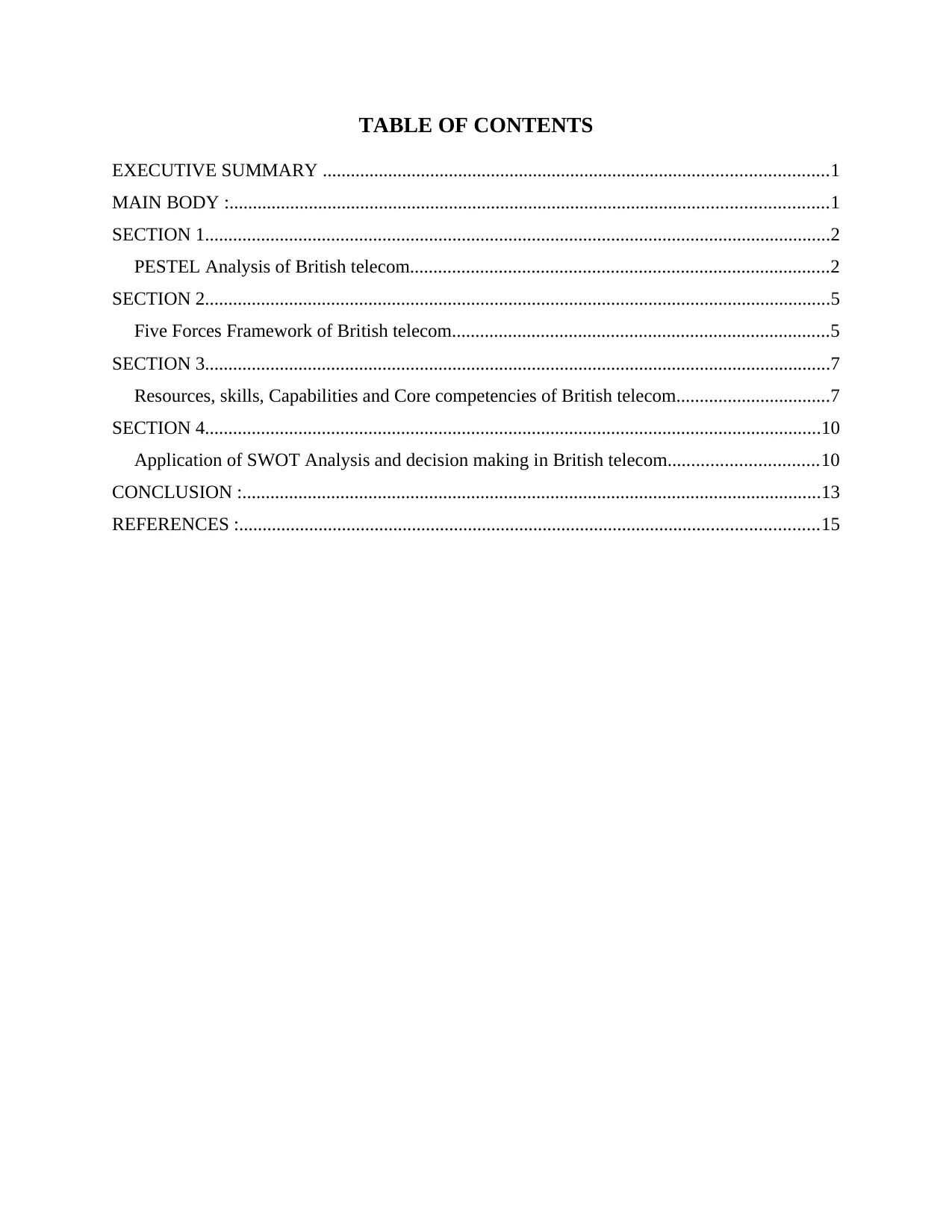
TABLE OF CONTENTS
EXECUTIVE SUMMARY ............................................................................................................1
MAIN BODY :................................................................................................................................1
SECTION 1......................................................................................................................................2
PESTEL Analysis of British telecom..........................................................................................2
SECTION 2......................................................................................................................................5
Five Forces Framework of British telecom.................................................................................5
SECTION 3......................................................................................................................................7
Resources, skills, Capabilities and Core competencies of British telecom.................................7
SECTION 4....................................................................................................................................10
Application of SWOT Analysis and decision making in British telecom................................10
CONCLUSION :............................................................................................................................13
REFERENCES :............................................................................................................................15
EXECUTIVE SUMMARY ............................................................................................................1
MAIN BODY :................................................................................................................................1
SECTION 1......................................................................................................................................2
PESTEL Analysis of British telecom..........................................................................................2
SECTION 2......................................................................................................................................5
Five Forces Framework of British telecom.................................................................................5
SECTION 3......................................................................................................................................7
Resources, skills, Capabilities and Core competencies of British telecom.................................7
SECTION 4....................................................................................................................................10
Application of SWOT Analysis and decision making in British telecom................................10
CONCLUSION :............................................................................................................................13
REFERENCES :............................................................................................................................15
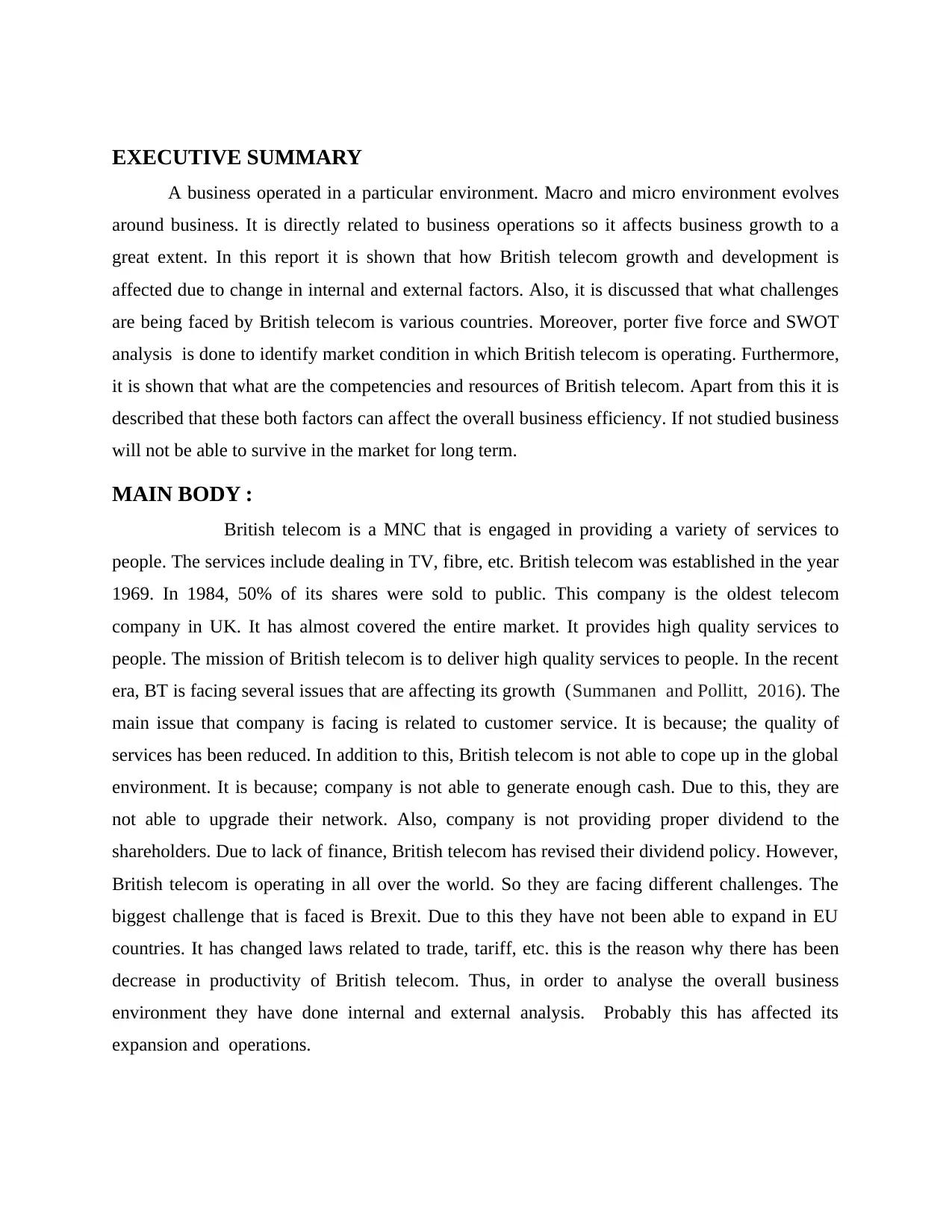
EXECUTIVE SUMMARY
A business operated in a particular environment. Macro and micro environment evolves
around business. It is directly related to business operations so it affects business growth to a
great extent. In this report it is shown that how British telecom growth and development is
affected due to change in internal and external factors. Also, it is discussed that what challenges
are being faced by British telecom is various countries. Moreover, porter five force and SWOT
analysis is done to identify market condition in which British telecom is operating. Furthermore,
it is shown that what are the competencies and resources of British telecom. Apart from this it is
described that these both factors can affect the overall business efficiency. If not studied business
will not be able to survive in the market for long term.
MAIN BODY :
British telecom is a MNC that is engaged in providing a variety of services to
people. The services include dealing in TV, fibre, etc. British telecom was established in the year
1969. In 1984, 50% of its shares were sold to public. This company is the oldest telecom
company in UK. It has almost covered the entire market. It provides high quality services to
people. The mission of British telecom is to deliver high quality services to people. In the recent
era, BT is facing several issues that are affecting its growth (Summanen and Pollitt, 2016). The
main issue that company is facing is related to customer service. It is because; the quality of
services has been reduced. In addition to this, British telecom is not able to cope up in the global
environment. It is because; company is not able to generate enough cash. Due to this, they are
not able to upgrade their network. Also, company is not providing proper dividend to the
shareholders. Due to lack of finance, British telecom has revised their dividend policy. However,
British telecom is operating in all over the world. So they are facing different challenges. The
biggest challenge that is faced is Brexit. Due to this they have not been able to expand in EU
countries. It has changed laws related to trade, tariff, etc. this is the reason why there has been
decrease in productivity of British telecom. Thus, in order to analyse the overall business
environment they have done internal and external analysis. Probably this has affected its
expansion and operations.
A business operated in a particular environment. Macro and micro environment evolves
around business. It is directly related to business operations so it affects business growth to a
great extent. In this report it is shown that how British telecom growth and development is
affected due to change in internal and external factors. Also, it is discussed that what challenges
are being faced by British telecom is various countries. Moreover, porter five force and SWOT
analysis is done to identify market condition in which British telecom is operating. Furthermore,
it is shown that what are the competencies and resources of British telecom. Apart from this it is
described that these both factors can affect the overall business efficiency. If not studied business
will not be able to survive in the market for long term.
MAIN BODY :
British telecom is a MNC that is engaged in providing a variety of services to
people. The services include dealing in TV, fibre, etc. British telecom was established in the year
1969. In 1984, 50% of its shares were sold to public. This company is the oldest telecom
company in UK. It has almost covered the entire market. It provides high quality services to
people. The mission of British telecom is to deliver high quality services to people. In the recent
era, BT is facing several issues that are affecting its growth (Summanen and Pollitt, 2016). The
main issue that company is facing is related to customer service. It is because; the quality of
services has been reduced. In addition to this, British telecom is not able to cope up in the global
environment. It is because; company is not able to generate enough cash. Due to this, they are
not able to upgrade their network. Also, company is not providing proper dividend to the
shareholders. Due to lack of finance, British telecom has revised their dividend policy. However,
British telecom is operating in all over the world. So they are facing different challenges. The
biggest challenge that is faced is Brexit. Due to this they have not been able to expand in EU
countries. It has changed laws related to trade, tariff, etc. this is the reason why there has been
decrease in productivity of British telecom. Thus, in order to analyse the overall business
environment they have done internal and external analysis. Probably this has affected its
expansion and operations.
⊘ This is a preview!⊘
Do you want full access?
Subscribe today to unlock all pages.

Trusted by 1+ million students worldwide
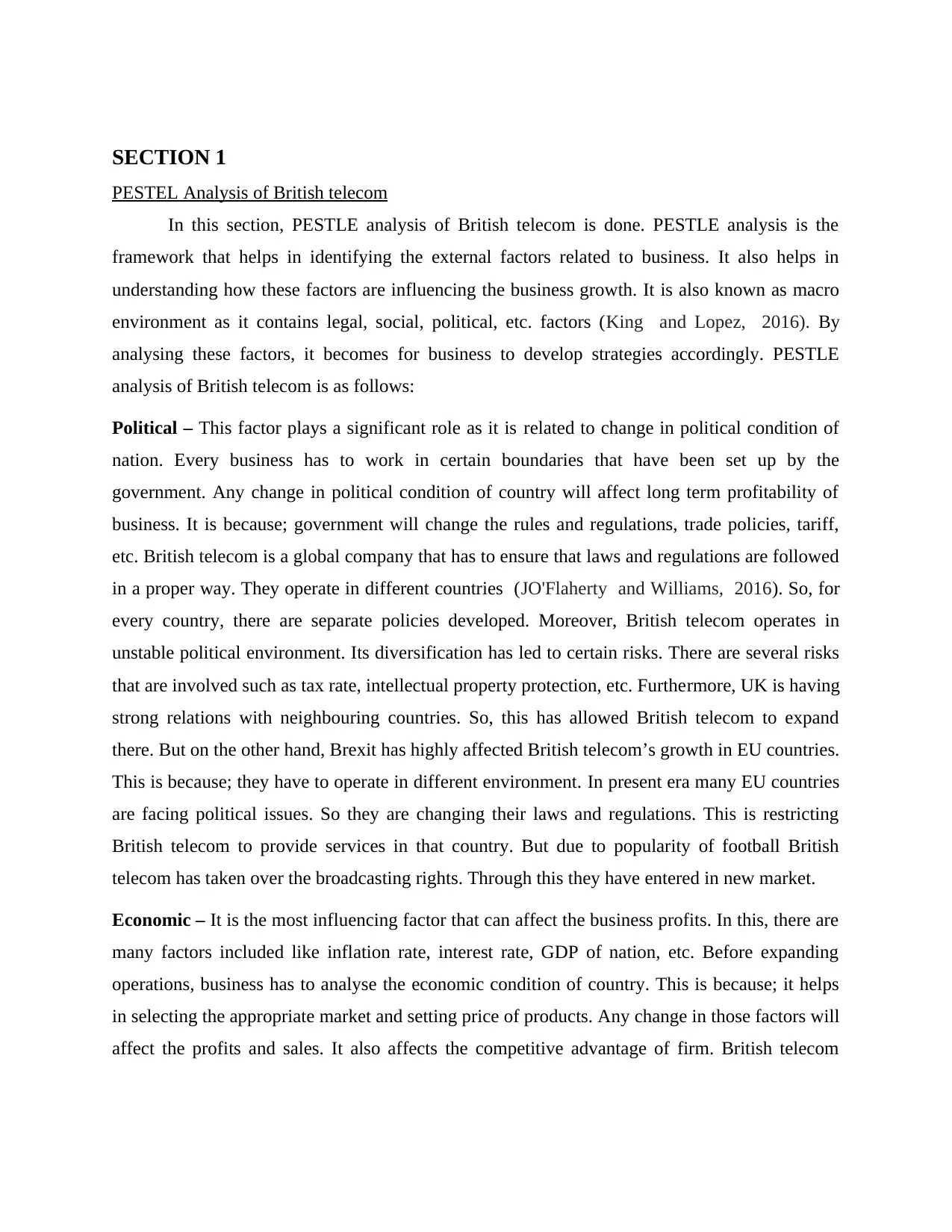
SECTION 1
PESTEL Analysis of British telecom
In this section, PESTLE analysis of British telecom is done. PESTLE analysis is the
framework that helps in identifying the external factors related to business. It also helps in
understanding how these factors are influencing the business growth. It is also known as macro
environment as it contains legal, social, political, etc. factors (King and Lopez, 2016). By
analysing these factors, it becomes for business to develop strategies accordingly. PESTLE
analysis of British telecom is as follows:
Political – This factor plays a significant role as it is related to change in political condition of
nation. Every business has to work in certain boundaries that have been set up by the
government. Any change in political condition of country will affect long term profitability of
business. It is because; government will change the rules and regulations, trade policies, tariff,
etc. British telecom is a global company that has to ensure that laws and regulations are followed
in a proper way. They operate in different countries (JO'Flaherty and Williams, 2016). So, for
every country, there are separate policies developed. Moreover, British telecom operates in
unstable political environment. Its diversification has led to certain risks. There are several risks
that are involved such as tax rate, intellectual property protection, etc. Furthermore, UK is having
strong relations with neighbouring countries. So, this has allowed British telecom to expand
there. But on the other hand, Brexit has highly affected British telecom’s growth in EU countries.
This is because; they have to operate in different environment. In present era many EU countries
are facing political issues. So they are changing their laws and regulations. This is restricting
British telecom to provide services in that country. But due to popularity of football British
telecom has taken over the broadcasting rights. Through this they have entered in new market.
Economic – It is the most influencing factor that can affect the business profits. In this, there are
many factors included like inflation rate, interest rate, GDP of nation, etc. Before expanding
operations, business has to analyse the economic condition of country. This is because; it helps
in selecting the appropriate market and setting price of products. Any change in those factors will
affect the profits and sales. It also affects the competitive advantage of firm. British telecom
PESTEL Analysis of British telecom
In this section, PESTLE analysis of British telecom is done. PESTLE analysis is the
framework that helps in identifying the external factors related to business. It also helps in
understanding how these factors are influencing the business growth. It is also known as macro
environment as it contains legal, social, political, etc. factors (King and Lopez, 2016). By
analysing these factors, it becomes for business to develop strategies accordingly. PESTLE
analysis of British telecom is as follows:
Political – This factor plays a significant role as it is related to change in political condition of
nation. Every business has to work in certain boundaries that have been set up by the
government. Any change in political condition of country will affect long term profitability of
business. It is because; government will change the rules and regulations, trade policies, tariff,
etc. British telecom is a global company that has to ensure that laws and regulations are followed
in a proper way. They operate in different countries (JO'Flaherty and Williams, 2016). So, for
every country, there are separate policies developed. Moreover, British telecom operates in
unstable political environment. Its diversification has led to certain risks. There are several risks
that are involved such as tax rate, intellectual property protection, etc. Furthermore, UK is having
strong relations with neighbouring countries. So, this has allowed British telecom to expand
there. But on the other hand, Brexit has highly affected British telecom’s growth in EU countries.
This is because; they have to operate in different environment. In present era many EU countries
are facing political issues. So they are changing their laws and regulations. This is restricting
British telecom to provide services in that country. But due to popularity of football British
telecom has taken over the broadcasting rights. Through this they have entered in new market.
Economic – It is the most influencing factor that can affect the business profits. In this, there are
many factors included like inflation rate, interest rate, GDP of nation, etc. Before expanding
operations, business has to analyse the economic condition of country. This is because; it helps
in selecting the appropriate market and setting price of products. Any change in those factors will
affect the profits and sales. It also affects the competitive advantage of firm. British telecom
Paraphrase This Document
Need a fresh take? Get an instant paraphrase of this document with our AI Paraphraser
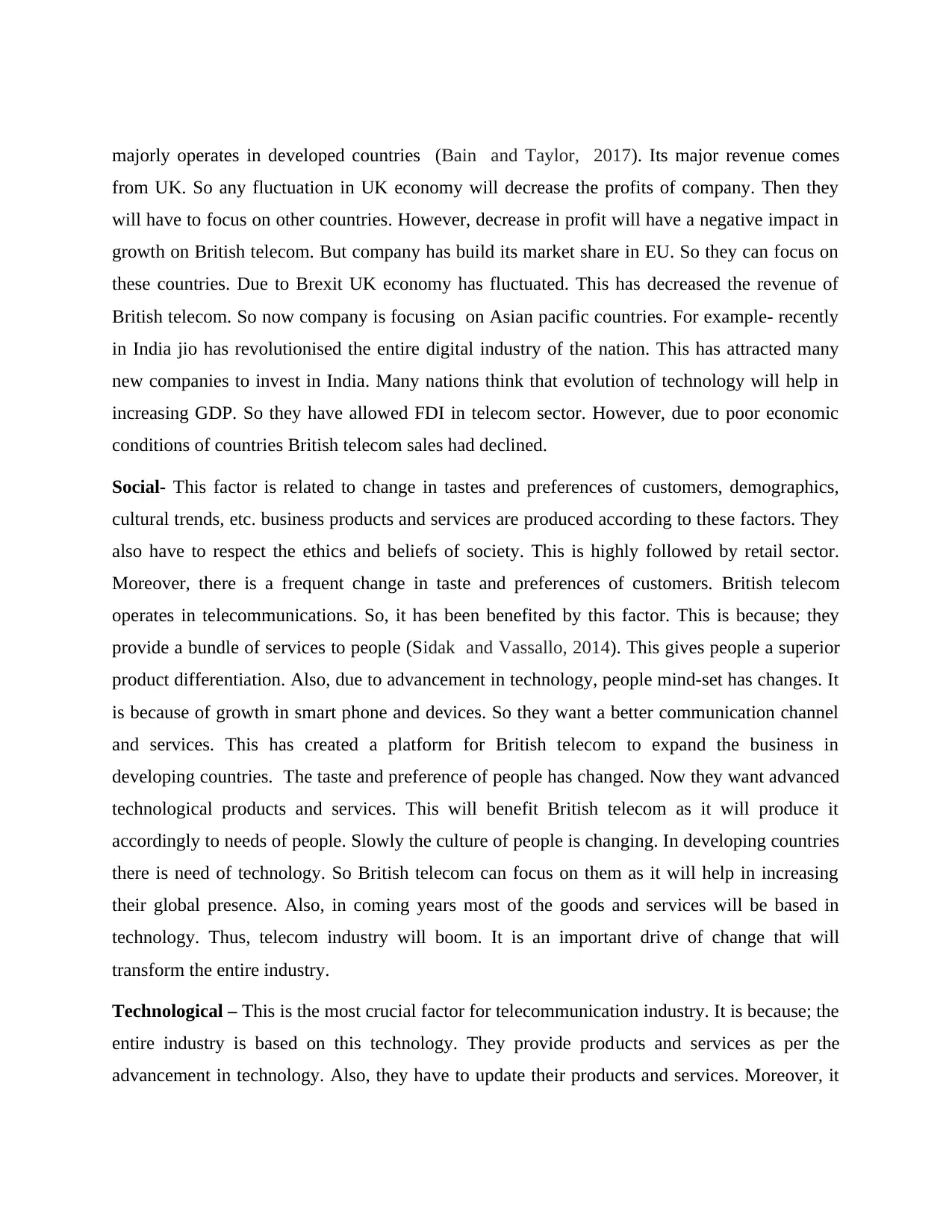
majorly operates in developed countries (Bain and Taylor, 2017). Its major revenue comes
from UK. So any fluctuation in UK economy will decrease the profits of company. Then they
will have to focus on other countries. However, decrease in profit will have a negative impact in
growth on British telecom. But company has build its market share in EU. So they can focus on
these countries. Due to Brexit UK economy has fluctuated. This has decreased the revenue of
British telecom. So now company is focusing on Asian pacific countries. For example- recently
in India jio has revolutionised the entire digital industry of the nation. This has attracted many
new companies to invest in India. Many nations think that evolution of technology will help in
increasing GDP. So they have allowed FDI in telecom sector. However, due to poor economic
conditions of countries British telecom sales had declined.
Social- This factor is related to change in tastes and preferences of customers, demographics,
cultural trends, etc. business products and services are produced according to these factors. They
also have to respect the ethics and beliefs of society. This is highly followed by retail sector.
Moreover, there is a frequent change in taste and preferences of customers. British telecom
operates in telecommunications. So, it has been benefited by this factor. This is because; they
provide a bundle of services to people (Sidak and Vassallo, 2014). This gives people a superior
product differentiation. Also, due to advancement in technology, people mind-set has changes. It
is because of growth in smart phone and devices. So they want a better communication channel
and services. This has created a platform for British telecom to expand the business in
developing countries. The taste and preference of people has changed. Now they want advanced
technological products and services. This will benefit British telecom as it will produce it
accordingly to needs of people. Slowly the culture of people is changing. In developing countries
there is need of technology. So British telecom can focus on them as it will help in increasing
their global presence. Also, in coming years most of the goods and services will be based in
technology. Thus, telecom industry will boom. It is an important drive of change that will
transform the entire industry.
Technological – This is the most crucial factor for telecommunication industry. It is because; the
entire industry is based on this technology. They provide products and services as per the
advancement in technology. Also, they have to update their products and services. Moreover, it
from UK. So any fluctuation in UK economy will decrease the profits of company. Then they
will have to focus on other countries. However, decrease in profit will have a negative impact in
growth on British telecom. But company has build its market share in EU. So they can focus on
these countries. Due to Brexit UK economy has fluctuated. This has decreased the revenue of
British telecom. So now company is focusing on Asian pacific countries. For example- recently
in India jio has revolutionised the entire digital industry of the nation. This has attracted many
new companies to invest in India. Many nations think that evolution of technology will help in
increasing GDP. So they have allowed FDI in telecom sector. However, due to poor economic
conditions of countries British telecom sales had declined.
Social- This factor is related to change in tastes and preferences of customers, demographics,
cultural trends, etc. business products and services are produced according to these factors. They
also have to respect the ethics and beliefs of society. This is highly followed by retail sector.
Moreover, there is a frequent change in taste and preferences of customers. British telecom
operates in telecommunications. So, it has been benefited by this factor. This is because; they
provide a bundle of services to people (Sidak and Vassallo, 2014). This gives people a superior
product differentiation. Also, due to advancement in technology, people mind-set has changes. It
is because of growth in smart phone and devices. So they want a better communication channel
and services. This has created a platform for British telecom to expand the business in
developing countries. The taste and preference of people has changed. Now they want advanced
technological products and services. This will benefit British telecom as it will produce it
accordingly to needs of people. Slowly the culture of people is changing. In developing countries
there is need of technology. So British telecom can focus on them as it will help in increasing
their global presence. Also, in coming years most of the goods and services will be based in
technology. Thus, telecom industry will boom. It is an important drive of change that will
transform the entire industry.
Technological – This is the most crucial factor for telecommunication industry. It is because; the
entire industry is based on this technology. They provide products and services as per the
advancement in technology. Also, they have to update their products and services. Moreover, it
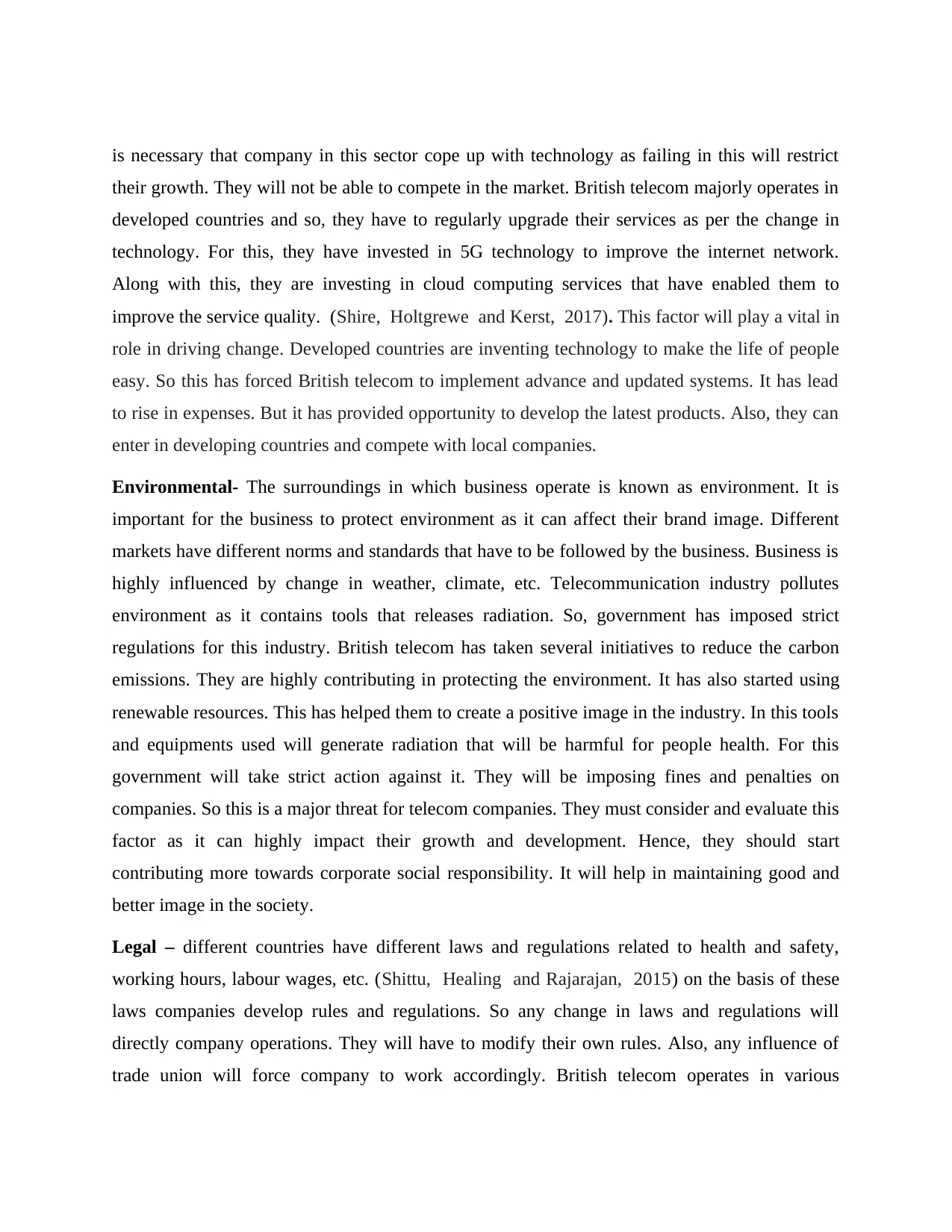
is necessary that company in this sector cope up with technology as failing in this will restrict
their growth. They will not be able to compete in the market. British telecom majorly operates in
developed countries and so, they have to regularly upgrade their services as per the change in
technology. For this, they have invested in 5G technology to improve the internet network.
Along with this, they are investing in cloud computing services that have enabled them to
improve the service quality. (Shire, Holtgrewe and Kerst, 2017). This factor will play a vital in
role in driving change. Developed countries are inventing technology to make the life of people
easy. So this has forced British telecom to implement advance and updated systems. It has lead
to rise in expenses. But it has provided opportunity to develop the latest products. Also, they can
enter in developing countries and compete with local companies.
Environmental- The surroundings in which business operate is known as environment. It is
important for the business to protect environment as it can affect their brand image. Different
markets have different norms and standards that have to be followed by the business. Business is
highly influenced by change in weather, climate, etc. Telecommunication industry pollutes
environment as it contains tools that releases radiation. So, government has imposed strict
regulations for this industry. British telecom has taken several initiatives to reduce the carbon
emissions. They are highly contributing in protecting the environment. It has also started using
renewable resources. This has helped them to create a positive image in the industry. In this tools
and equipments used will generate radiation that will be harmful for people health. For this
government will take strict action against it. They will be imposing fines and penalties on
companies. So this is a major threat for telecom companies. They must consider and evaluate this
factor as it can highly impact their growth and development. Hence, they should start
contributing more towards corporate social responsibility. It will help in maintaining good and
better image in the society.
Legal – different countries have different laws and regulations related to health and safety,
working hours, labour wages, etc. (Shittu, Healing and Rajarajan, 2015) on the basis of these
laws companies develop rules and regulations. So any change in laws and regulations will
directly company operations. They will have to modify their own rules. Also, any influence of
trade union will force company to work accordingly. British telecom operates in various
their growth. They will not be able to compete in the market. British telecom majorly operates in
developed countries and so, they have to regularly upgrade their services as per the change in
technology. For this, they have invested in 5G technology to improve the internet network.
Along with this, they are investing in cloud computing services that have enabled them to
improve the service quality. (Shire, Holtgrewe and Kerst, 2017). This factor will play a vital in
role in driving change. Developed countries are inventing technology to make the life of people
easy. So this has forced British telecom to implement advance and updated systems. It has lead
to rise in expenses. But it has provided opportunity to develop the latest products. Also, they can
enter in developing countries and compete with local companies.
Environmental- The surroundings in which business operate is known as environment. It is
important for the business to protect environment as it can affect their brand image. Different
markets have different norms and standards that have to be followed by the business. Business is
highly influenced by change in weather, climate, etc. Telecommunication industry pollutes
environment as it contains tools that releases radiation. So, government has imposed strict
regulations for this industry. British telecom has taken several initiatives to reduce the carbon
emissions. They are highly contributing in protecting the environment. It has also started using
renewable resources. This has helped them to create a positive image in the industry. In this tools
and equipments used will generate radiation that will be harmful for people health. For this
government will take strict action against it. They will be imposing fines and penalties on
companies. So this is a major threat for telecom companies. They must consider and evaluate this
factor as it can highly impact their growth and development. Hence, they should start
contributing more towards corporate social responsibility. It will help in maintaining good and
better image in the society.
Legal – different countries have different laws and regulations related to health and safety,
working hours, labour wages, etc. (Shittu, Healing and Rajarajan, 2015) on the basis of these
laws companies develop rules and regulations. So any change in laws and regulations will
directly company operations. They will have to modify their own rules. Also, any influence of
trade union will force company to work accordingly. British telecom operates in various
⊘ This is a preview!⊘
Do you want full access?
Subscribe today to unlock all pages.

Trusted by 1+ million students worldwide
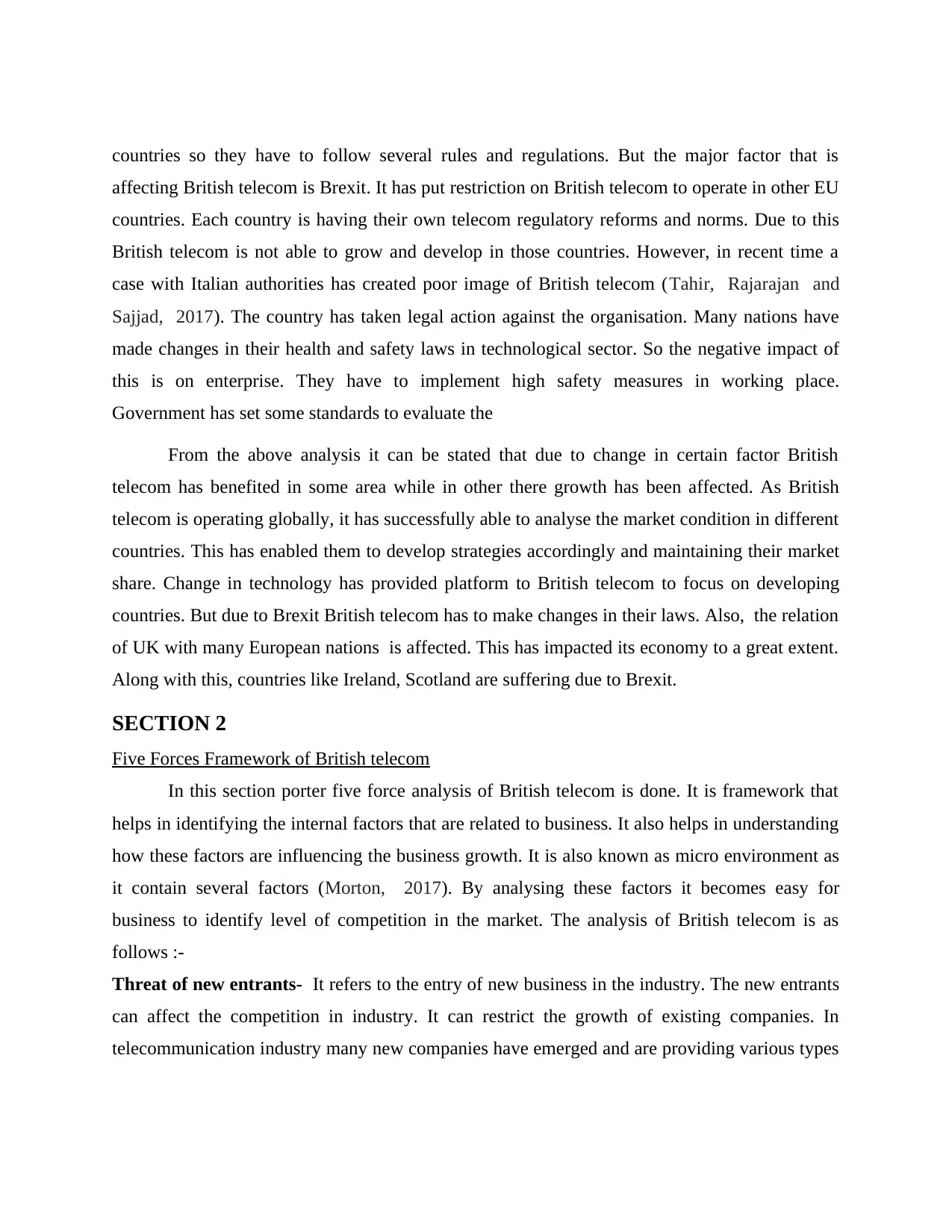
countries so they have to follow several rules and regulations. But the major factor that is
affecting British telecom is Brexit. It has put restriction on British telecom to operate in other EU
countries. Each country is having their own telecom regulatory reforms and norms. Due to this
British telecom is not able to grow and develop in those countries. However, in recent time a
case with Italian authorities has created poor image of British telecom (Tahir, Rajarajan and
Sajjad, 2017). The country has taken legal action against the organisation. Many nations have
made changes in their health and safety laws in technological sector. So the negative impact of
this is on enterprise. They have to implement high safety measures in working place.
Government has set some standards to evaluate the
From the above analysis it can be stated that due to change in certain factor British
telecom has benefited in some area while in other there growth has been affected. As British
telecom is operating globally, it has successfully able to analyse the market condition in different
countries. This has enabled them to develop strategies accordingly and maintaining their market
share. Change in technology has provided platform to British telecom to focus on developing
countries. But due to Brexit British telecom has to make changes in their laws. Also, the relation
of UK with many European nations is affected. This has impacted its economy to a great extent.
Along with this, countries like Ireland, Scotland are suffering due to Brexit.
SECTION 2
Five Forces Framework of British telecom
In this section porter five force analysis of British telecom is done. It is framework that
helps in identifying the internal factors that are related to business. It also helps in understanding
how these factors are influencing the business growth. It is also known as micro environment as
it contain several factors (Morton, 2017). By analysing these factors it becomes easy for
business to identify level of competition in the market. The analysis of British telecom is as
follows :-
Threat of new entrants- It refers to the entry of new business in the industry. The new entrants
can affect the competition in industry. It can restrict the growth of existing companies. In
telecommunication industry many new companies have emerged and are providing various types
affecting British telecom is Brexit. It has put restriction on British telecom to operate in other EU
countries. Each country is having their own telecom regulatory reforms and norms. Due to this
British telecom is not able to grow and develop in those countries. However, in recent time a
case with Italian authorities has created poor image of British telecom (Tahir, Rajarajan and
Sajjad, 2017). The country has taken legal action against the organisation. Many nations have
made changes in their health and safety laws in technological sector. So the negative impact of
this is on enterprise. They have to implement high safety measures in working place.
Government has set some standards to evaluate the
From the above analysis it can be stated that due to change in certain factor British
telecom has benefited in some area while in other there growth has been affected. As British
telecom is operating globally, it has successfully able to analyse the market condition in different
countries. This has enabled them to develop strategies accordingly and maintaining their market
share. Change in technology has provided platform to British telecom to focus on developing
countries. But due to Brexit British telecom has to make changes in their laws. Also, the relation
of UK with many European nations is affected. This has impacted its economy to a great extent.
Along with this, countries like Ireland, Scotland are suffering due to Brexit.
SECTION 2
Five Forces Framework of British telecom
In this section porter five force analysis of British telecom is done. It is framework that
helps in identifying the internal factors that are related to business. It also helps in understanding
how these factors are influencing the business growth. It is also known as micro environment as
it contain several factors (Morton, 2017). By analysing these factors it becomes easy for
business to identify level of competition in the market. The analysis of British telecom is as
follows :-
Threat of new entrants- It refers to the entry of new business in the industry. The new entrants
can affect the competition in industry. It can restrict the growth of existing companies. In
telecommunication industry many new companies have emerged and are providing various types
Paraphrase This Document
Need a fresh take? Get an instant paraphrase of this document with our AI Paraphraser
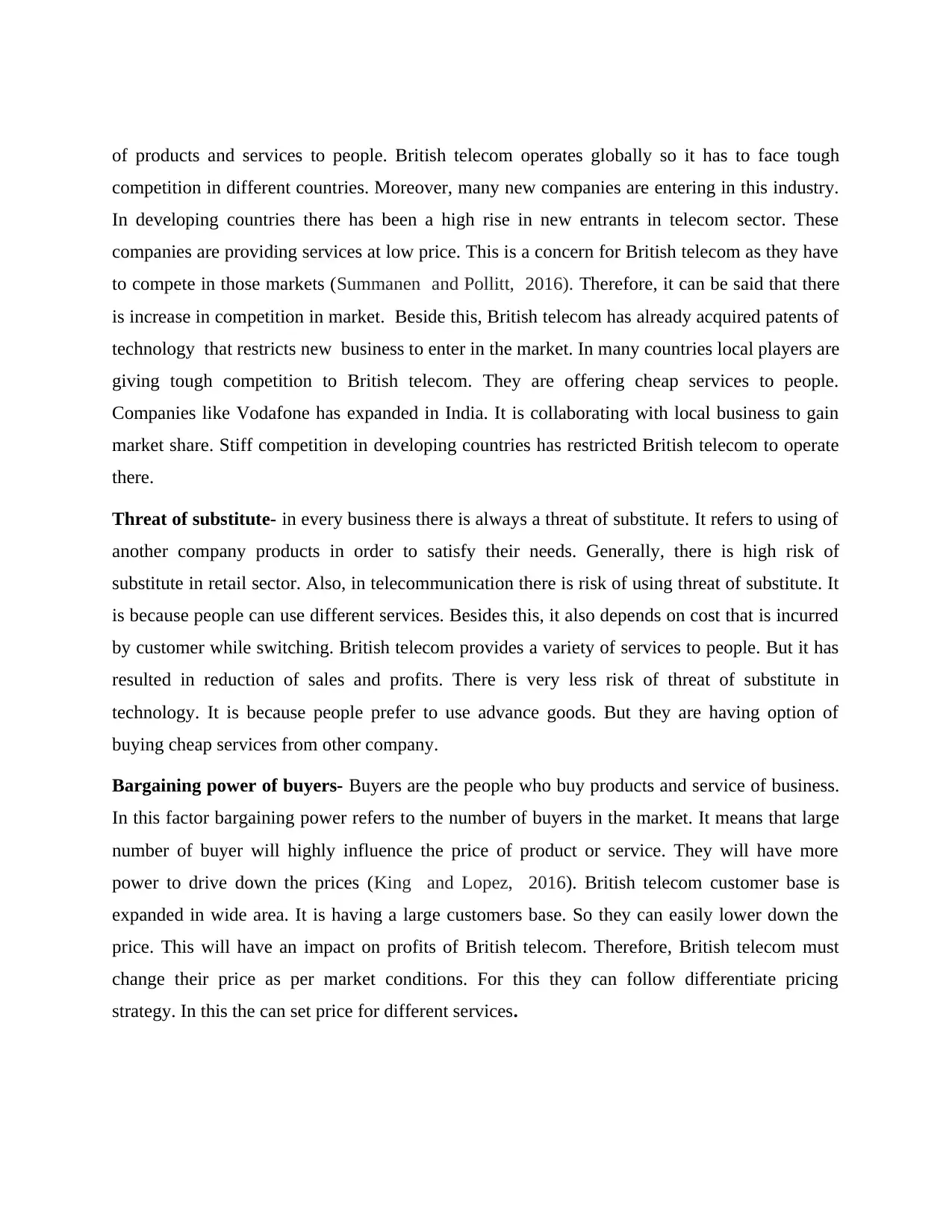
of products and services to people. British telecom operates globally so it has to face tough
competition in different countries. Moreover, many new companies are entering in this industry.
In developing countries there has been a high rise in new entrants in telecom sector. These
companies are providing services at low price. This is a concern for British telecom as they have
to compete in those markets (Summanen and Pollitt, 2016). Therefore, it can be said that there
is increase in competition in market. Beside this, British telecom has already acquired patents of
technology that restricts new business to enter in the market. In many countries local players are
giving tough competition to British telecom. They are offering cheap services to people.
Companies like Vodafone has expanded in India. It is collaborating with local business to gain
market share. Stiff competition in developing countries has restricted British telecom to operate
there.
Threat of substitute- in every business there is always a threat of substitute. It refers to using of
another company products in order to satisfy their needs. Generally, there is high risk of
substitute in retail sector. Also, in telecommunication there is risk of using threat of substitute. It
is because people can use different services. Besides this, it also depends on cost that is incurred
by customer while switching. British telecom provides a variety of services to people. But it has
resulted in reduction of sales and profits. There is very less risk of threat of substitute in
technology. It is because people prefer to use advance goods. But they are having option of
buying cheap services from other company.
Bargaining power of buyers- Buyers are the people who buy products and service of business.
In this factor bargaining power refers to the number of buyers in the market. It means that large
number of buyer will highly influence the price of product or service. They will have more
power to drive down the prices (King and Lopez, 2016). British telecom customer base is
expanded in wide area. It is having a large customers base. So they can easily lower down the
price. This will have an impact on profits of British telecom. Therefore, British telecom must
change their price as per market conditions. For this they can follow differentiate pricing
strategy. In this the can set price for different services.
competition in different countries. Moreover, many new companies are entering in this industry.
In developing countries there has been a high rise in new entrants in telecom sector. These
companies are providing services at low price. This is a concern for British telecom as they have
to compete in those markets (Summanen and Pollitt, 2016). Therefore, it can be said that there
is increase in competition in market. Beside this, British telecom has already acquired patents of
technology that restricts new business to enter in the market. In many countries local players are
giving tough competition to British telecom. They are offering cheap services to people.
Companies like Vodafone has expanded in India. It is collaborating with local business to gain
market share. Stiff competition in developing countries has restricted British telecom to operate
there.
Threat of substitute- in every business there is always a threat of substitute. It refers to using of
another company products in order to satisfy their needs. Generally, there is high risk of
substitute in retail sector. Also, in telecommunication there is risk of using threat of substitute. It
is because people can use different services. Besides this, it also depends on cost that is incurred
by customer while switching. British telecom provides a variety of services to people. But it has
resulted in reduction of sales and profits. There is very less risk of threat of substitute in
technology. It is because people prefer to use advance goods. But they are having option of
buying cheap services from other company.
Bargaining power of buyers- Buyers are the people who buy products and service of business.
In this factor bargaining power refers to the number of buyers in the market. It means that large
number of buyer will highly influence the price of product or service. They will have more
power to drive down the prices (King and Lopez, 2016). British telecom customer base is
expanded in wide area. It is having a large customers base. So they can easily lower down the
price. This will have an impact on profits of British telecom. Therefore, British telecom must
change their price as per market conditions. For this they can follow differentiate pricing
strategy. In this the can set price for different services.
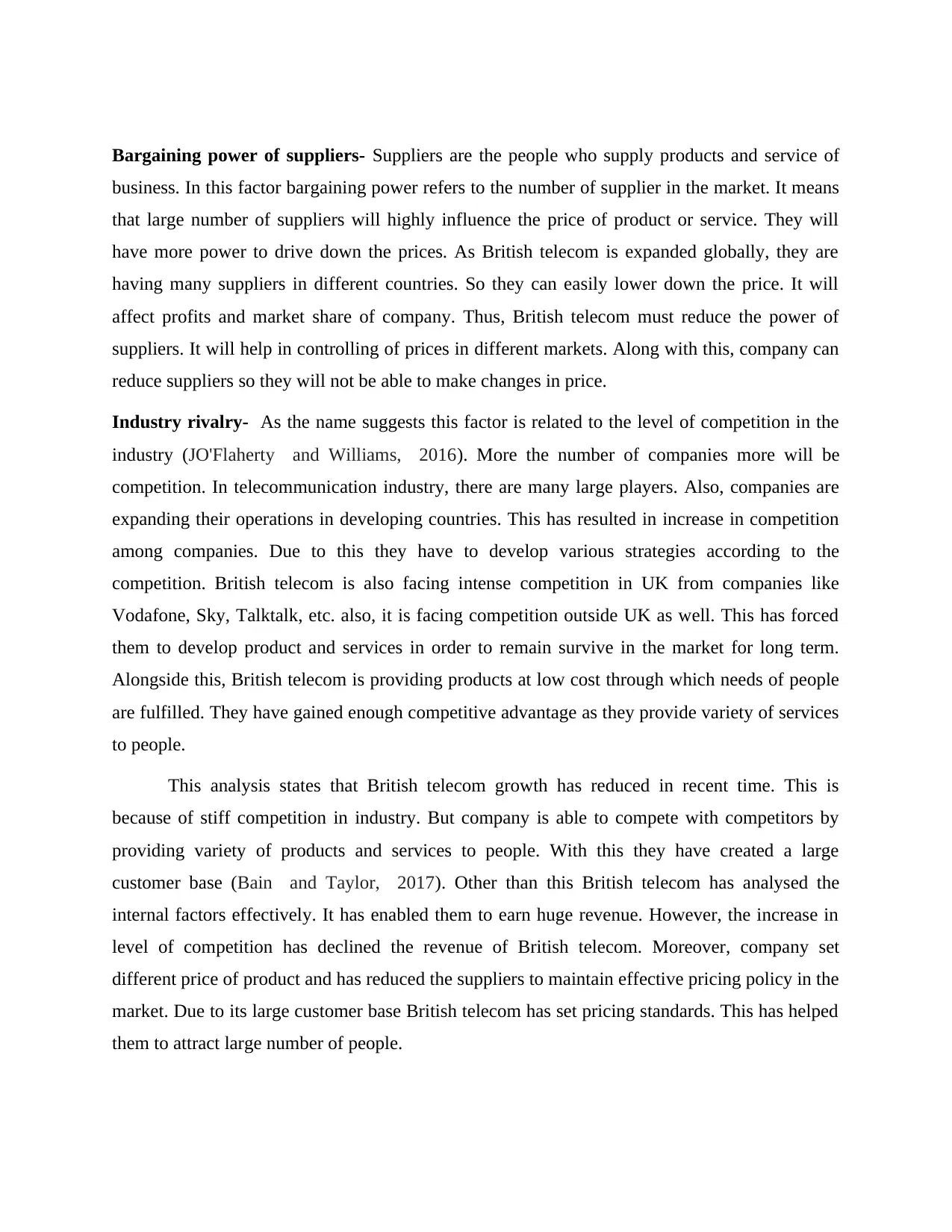
Bargaining power of suppliers- Suppliers are the people who supply products and service of
business. In this factor bargaining power refers to the number of supplier in the market. It means
that large number of suppliers will highly influence the price of product or service. They will
have more power to drive down the prices. As British telecom is expanded globally, they are
having many suppliers in different countries. So they can easily lower down the price. It will
affect profits and market share of company. Thus, British telecom must reduce the power of
suppliers. It will help in controlling of prices in different markets. Along with this, company can
reduce suppliers so they will not be able to make changes in price.
Industry rivalry- As the name suggests this factor is related to the level of competition in the
industry (JO'Flaherty and Williams, 2016). More the number of companies more will be
competition. In telecommunication industry, there are many large players. Also, companies are
expanding their operations in developing countries. This has resulted in increase in competition
among companies. Due to this they have to develop various strategies according to the
competition. British telecom is also facing intense competition in UK from companies like
Vodafone, Sky, Talktalk, etc. also, it is facing competition outside UK as well. This has forced
them to develop product and services in order to remain survive in the market for long term.
Alongside this, British telecom is providing products at low cost through which needs of people
are fulfilled. They have gained enough competitive advantage as they provide variety of services
to people.
This analysis states that British telecom growth has reduced in recent time. This is
because of stiff competition in industry. But company is able to compete with competitors by
providing variety of products and services to people. With this they have created a large
customer base (Bain and Taylor, 2017). Other than this British telecom has analysed the
internal factors effectively. It has enabled them to earn huge revenue. However, the increase in
level of competition has declined the revenue of British telecom. Moreover, company set
different price of product and has reduced the suppliers to maintain effective pricing policy in the
market. Due to its large customer base British telecom has set pricing standards. This has helped
them to attract large number of people.
business. In this factor bargaining power refers to the number of supplier in the market. It means
that large number of suppliers will highly influence the price of product or service. They will
have more power to drive down the prices. As British telecom is expanded globally, they are
having many suppliers in different countries. So they can easily lower down the price. It will
affect profits and market share of company. Thus, British telecom must reduce the power of
suppliers. It will help in controlling of prices in different markets. Along with this, company can
reduce suppliers so they will not be able to make changes in price.
Industry rivalry- As the name suggests this factor is related to the level of competition in the
industry (JO'Flaherty and Williams, 2016). More the number of companies more will be
competition. In telecommunication industry, there are many large players. Also, companies are
expanding their operations in developing countries. This has resulted in increase in competition
among companies. Due to this they have to develop various strategies according to the
competition. British telecom is also facing intense competition in UK from companies like
Vodafone, Sky, Talktalk, etc. also, it is facing competition outside UK as well. This has forced
them to develop product and services in order to remain survive in the market for long term.
Alongside this, British telecom is providing products at low cost through which needs of people
are fulfilled. They have gained enough competitive advantage as they provide variety of services
to people.
This analysis states that British telecom growth has reduced in recent time. This is
because of stiff competition in industry. But company is able to compete with competitors by
providing variety of products and services to people. With this they have created a large
customer base (Bain and Taylor, 2017). Other than this British telecom has analysed the
internal factors effectively. It has enabled them to earn huge revenue. However, the increase in
level of competition has declined the revenue of British telecom. Moreover, company set
different price of product and has reduced the suppliers to maintain effective pricing policy in the
market. Due to its large customer base British telecom has set pricing standards. This has helped
them to attract large number of people.
⊘ This is a preview!⊘
Do you want full access?
Subscribe today to unlock all pages.

Trusted by 1+ million students worldwide
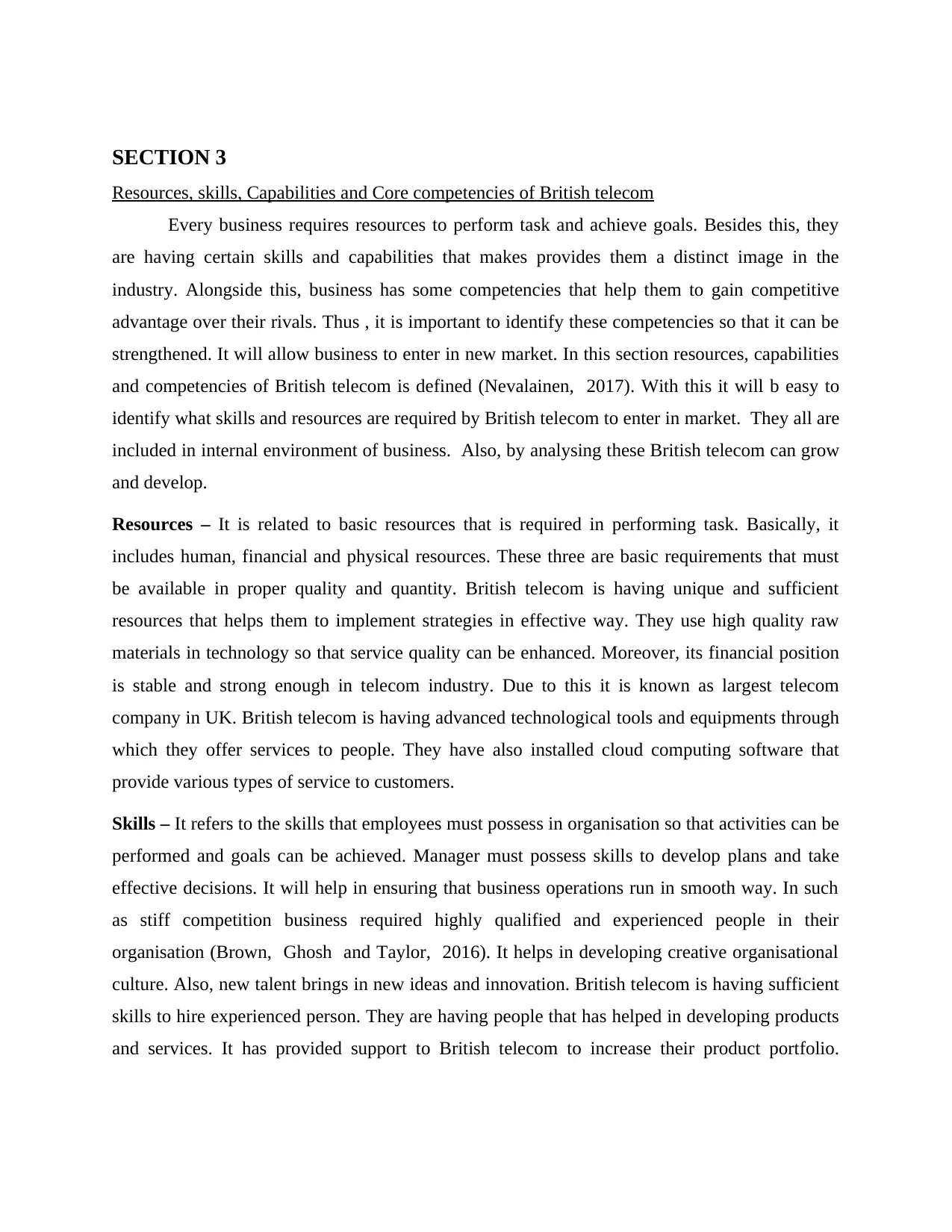
SECTION 3
Resources, skills, Capabilities and Core competencies of British telecom
Every business requires resources to perform task and achieve goals. Besides this, they
are having certain skills and capabilities that makes provides them a distinct image in the
industry. Alongside this, business has some competencies that help them to gain competitive
advantage over their rivals. Thus , it is important to identify these competencies so that it can be
strengthened. It will allow business to enter in new market. In this section resources, capabilities
and competencies of British telecom is defined (Nevalainen, 2017). With this it will b easy to
identify what skills and resources are required by British telecom to enter in market. They all are
included in internal environment of business. Also, by analysing these British telecom can grow
and develop.
Resources – It is related to basic resources that is required in performing task. Basically, it
includes human, financial and physical resources. These three are basic requirements that must
be available in proper quality and quantity. British telecom is having unique and sufficient
resources that helps them to implement strategies in effective way. They use high quality raw
materials in technology so that service quality can be enhanced. Moreover, its financial position
is stable and strong enough in telecom industry. Due to this it is known as largest telecom
company in UK. British telecom is having advanced technological tools and equipments through
which they offer services to people. They have also installed cloud computing software that
provide various types of service to customers.
Skills – It refers to the skills that employees must possess in organisation so that activities can be
performed and goals can be achieved. Manager must possess skills to develop plans and take
effective decisions. It will help in ensuring that business operations run in smooth way. In such
as stiff competition business required highly qualified and experienced people in their
organisation (Brown, Ghosh and Taylor, 2016). It helps in developing creative organisational
culture. Also, new talent brings in new ideas and innovation. British telecom is having sufficient
skills to hire experienced person. They are having people that has helped in developing products
and services. It has provided support to British telecom to increase their product portfolio.
Resources, skills, Capabilities and Core competencies of British telecom
Every business requires resources to perform task and achieve goals. Besides this, they
are having certain skills and capabilities that makes provides them a distinct image in the
industry. Alongside this, business has some competencies that help them to gain competitive
advantage over their rivals. Thus , it is important to identify these competencies so that it can be
strengthened. It will allow business to enter in new market. In this section resources, capabilities
and competencies of British telecom is defined (Nevalainen, 2017). With this it will b easy to
identify what skills and resources are required by British telecom to enter in market. They all are
included in internal environment of business. Also, by analysing these British telecom can grow
and develop.
Resources – It is related to basic resources that is required in performing task. Basically, it
includes human, financial and physical resources. These three are basic requirements that must
be available in proper quality and quantity. British telecom is having unique and sufficient
resources that helps them to implement strategies in effective way. They use high quality raw
materials in technology so that service quality can be enhanced. Moreover, its financial position
is stable and strong enough in telecom industry. Due to this it is known as largest telecom
company in UK. British telecom is having advanced technological tools and equipments through
which they offer services to people. They have also installed cloud computing software that
provide various types of service to customers.
Skills – It refers to the skills that employees must possess in organisation so that activities can be
performed and goals can be achieved. Manager must possess skills to develop plans and take
effective decisions. It will help in ensuring that business operations run in smooth way. In such
as stiff competition business required highly qualified and experienced people in their
organisation (Brown, Ghosh and Taylor, 2016). It helps in developing creative organisational
culture. Also, new talent brings in new ideas and innovation. British telecom is having sufficient
skills to hire experienced person. They are having people that has helped in developing products
and services. It has provided support to British telecom to increase their product portfolio.
Paraphrase This Document
Need a fresh take? Get an instant paraphrase of this document with our AI Paraphraser
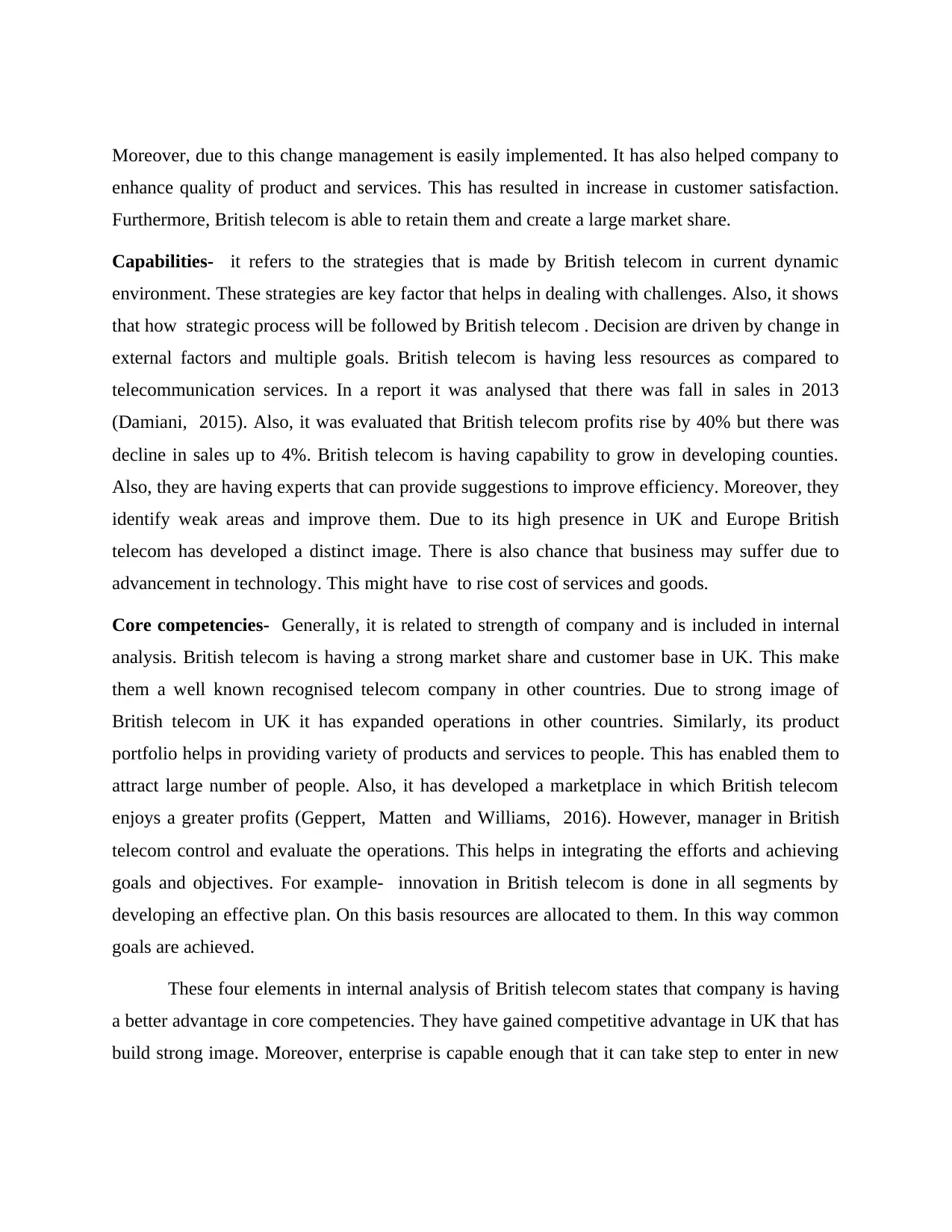
Moreover, due to this change management is easily implemented. It has also helped company to
enhance quality of product and services. This has resulted in increase in customer satisfaction.
Furthermore, British telecom is able to retain them and create a large market share.
Capabilities- it refers to the strategies that is made by British telecom in current dynamic
environment. These strategies are key factor that helps in dealing with challenges. Also, it shows
that how strategic process will be followed by British telecom . Decision are driven by change in
external factors and multiple goals. British telecom is having less resources as compared to
telecommunication services. In a report it was analysed that there was fall in sales in 2013
(Damiani, 2015). Also, it was evaluated that British telecom profits rise by 40% but there was
decline in sales up to 4%. British telecom is having capability to grow in developing counties.
Also, they are having experts that can provide suggestions to improve efficiency. Moreover, they
identify weak areas and improve them. Due to its high presence in UK and Europe British
telecom has developed a distinct image. There is also chance that business may suffer due to
advancement in technology. This might have to rise cost of services and goods.
Core competencies- Generally, it is related to strength of company and is included in internal
analysis. British telecom is having a strong market share and customer base in UK. This make
them a well known recognised telecom company in other countries. Due to strong image of
British telecom in UK it has expanded operations in other countries. Similarly, its product
portfolio helps in providing variety of products and services to people. This has enabled them to
attract large number of people. Also, it has developed a marketplace in which British telecom
enjoys a greater profits (Geppert, Matten and Williams, 2016). However, manager in British
telecom control and evaluate the operations. This helps in integrating the efforts and achieving
goals and objectives. For example- innovation in British telecom is done in all segments by
developing an effective plan. On this basis resources are allocated to them. In this way common
goals are achieved.
These four elements in internal analysis of British telecom states that company is having
a better advantage in core competencies. They have gained competitive advantage in UK that has
build strong image. Moreover, enterprise is capable enough that it can take step to enter in new
enhance quality of product and services. This has resulted in increase in customer satisfaction.
Furthermore, British telecom is able to retain them and create a large market share.
Capabilities- it refers to the strategies that is made by British telecom in current dynamic
environment. These strategies are key factor that helps in dealing with challenges. Also, it shows
that how strategic process will be followed by British telecom . Decision are driven by change in
external factors and multiple goals. British telecom is having less resources as compared to
telecommunication services. In a report it was analysed that there was fall in sales in 2013
(Damiani, 2015). Also, it was evaluated that British telecom profits rise by 40% but there was
decline in sales up to 4%. British telecom is having capability to grow in developing counties.
Also, they are having experts that can provide suggestions to improve efficiency. Moreover, they
identify weak areas and improve them. Due to its high presence in UK and Europe British
telecom has developed a distinct image. There is also chance that business may suffer due to
advancement in technology. This might have to rise cost of services and goods.
Core competencies- Generally, it is related to strength of company and is included in internal
analysis. British telecom is having a strong market share and customer base in UK. This make
them a well known recognised telecom company in other countries. Due to strong image of
British telecom in UK it has expanded operations in other countries. Similarly, its product
portfolio helps in providing variety of products and services to people. This has enabled them to
attract large number of people. Also, it has developed a marketplace in which British telecom
enjoys a greater profits (Geppert, Matten and Williams, 2016). However, manager in British
telecom control and evaluate the operations. This helps in integrating the efforts and achieving
goals and objectives. For example- innovation in British telecom is done in all segments by
developing an effective plan. On this basis resources are allocated to them. In this way common
goals are achieved.
These four elements in internal analysis of British telecom states that company is having
a better advantage in core competencies. They have gained competitive advantage in UK that has
build strong image. Moreover, enterprise is capable enough that it can take step to enter in new
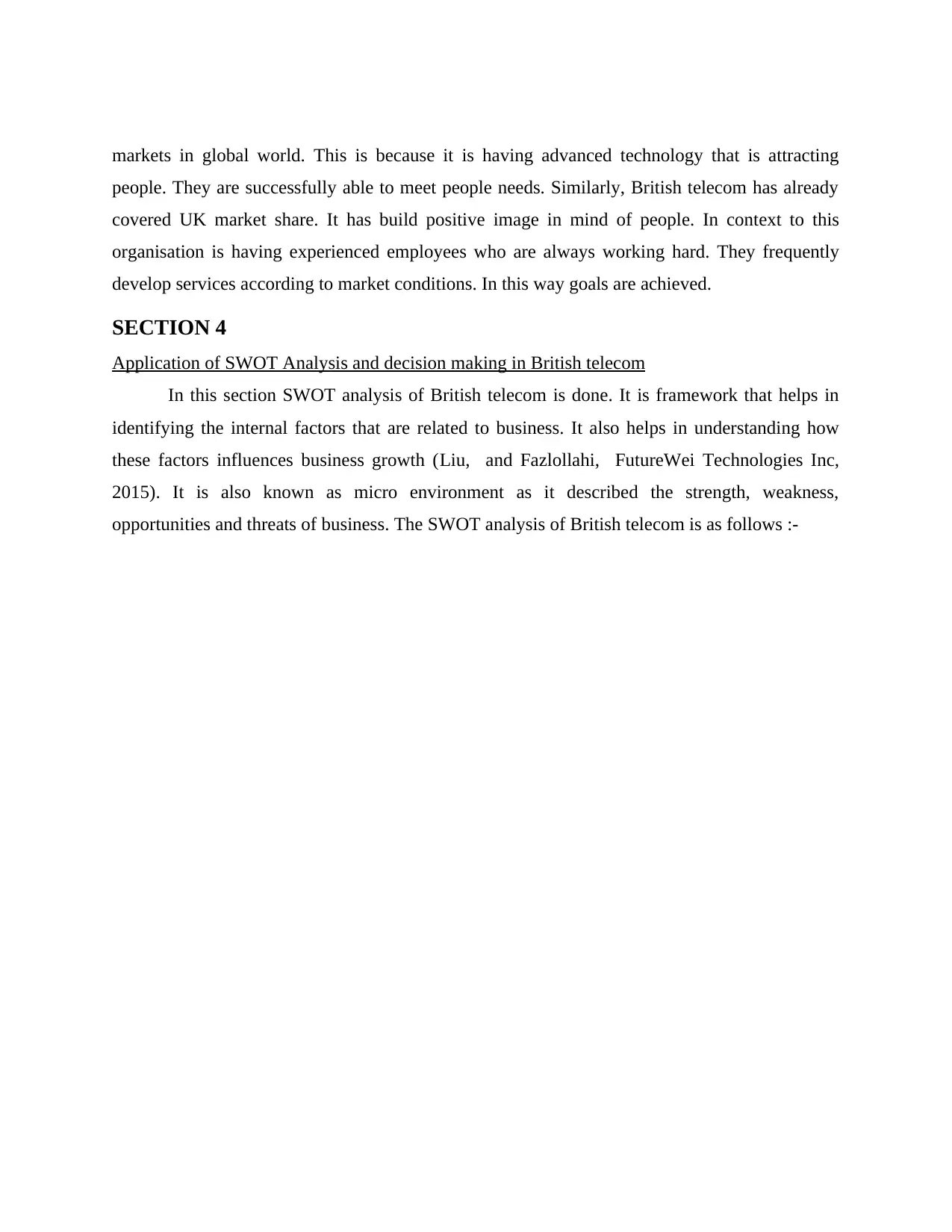
markets in global world. This is because it is having advanced technology that is attracting
people. They are successfully able to meet people needs. Similarly, British telecom has already
covered UK market share. It has build positive image in mind of people. In context to this
organisation is having experienced employees who are always working hard. They frequently
develop services according to market conditions. In this way goals are achieved.
SECTION 4
Application of SWOT Analysis and decision making in British telecom
In this section SWOT analysis of British telecom is done. It is framework that helps in
identifying the internal factors that are related to business. It also helps in understanding how
these factors influences business growth (Liu, and Fazlollahi, FutureWei Technologies Inc,
2015). It is also known as micro environment as it described the strength, weakness,
opportunities and threats of business. The SWOT analysis of British telecom is as follows :-
people. They are successfully able to meet people needs. Similarly, British telecom has already
covered UK market share. It has build positive image in mind of people. In context to this
organisation is having experienced employees who are always working hard. They frequently
develop services according to market conditions. In this way goals are achieved.
SECTION 4
Application of SWOT Analysis and decision making in British telecom
In this section SWOT analysis of British telecom is done. It is framework that helps in
identifying the internal factors that are related to business. It also helps in understanding how
these factors influences business growth (Liu, and Fazlollahi, FutureWei Technologies Inc,
2015). It is also known as micro environment as it described the strength, weakness,
opportunities and threats of business. The SWOT analysis of British telecom is as follows :-
⊘ This is a preview!⊘
Do you want full access?
Subscribe today to unlock all pages.

Trusted by 1+ million students worldwide
1 out of 18
Related Documents
Your All-in-One AI-Powered Toolkit for Academic Success.
+13062052269
info@desklib.com
Available 24*7 on WhatsApp / Email
![[object Object]](/_next/static/media/star-bottom.7253800d.svg)
Unlock your academic potential
Copyright © 2020–2026 A2Z Services. All Rights Reserved. Developed and managed by ZUCOL.




